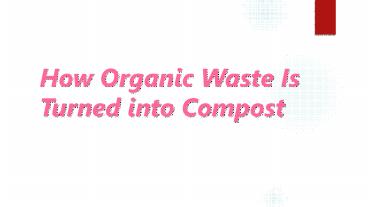How Organic Waste Is Turned into Compost - PowerPoint PPT Presentation
Title:
How Organic Waste Is Turned into Compost
Description:
Organic waste contains plant elements that are discarded and treated as waste because they are biodegradable. Biodegradable waste comprises organic materials that microbes and other living things may break down into carbon dioxide, water, methane, or simple organic molecules by composting, aerobic digestion, anaerobic digestion, or other similar processes – PowerPoint PPT presentation
Number of Views:340
Title: How Organic Waste Is Turned into Compost
1
How Organic Waste Is Turned into Compost
2
(No Transcript)
3
- Organic waste contains plant elements that are
discarded and treated as waste because they are
biodegradable. Biodegradable waste comprises
organic materials that microbes and other living
things may break down into carbon dioxide, water,
methane, or simple organic molecules by
composting, aerobic digestion, anaerobic
digestion, or other similar processes. - Organic wastes include eggshells, fruits and
vegetables, flowers and plants, rice and beans,
dairy products, meat, poultry, fish, bones, paper
products, milk cartons, tea bags, coffee grounds,
and tea/coffee filters gardening waste, and so
on. These wastes may be turned into compost,
fertilizers, soil, and energy or fuel, among
other things.
4
- What Is Compost
- The organic substance that decomposes during the
composting of food waste is known as compost.
Various forms of organic materials, also called
waste products, are recycled in the composting
process, after which the soil conditioner or
compost is created. - Compost is nutrient-dense. It may be utilized in
gardening, landscaping, horticulture, urban
agriculture, organic farming, and other
applications. Compost may also help with erosion
management, land and stream restoration, wetland
building, and landfill covers, among other
things.
5
- Process Of Conversion
- Composting is natures way of recycling.
Decomposing organic waste such as food waste,
manure, leaves, grass trimmings, paper, wood,
feathers, crop residue, and other organic waste
produces valuable organic fertilizer. It is a
natural biological process that takes place
under-regulated aerobic circumstances.
Microorganisms such as bacteria and fungus play a
critical part in this process by breaking down
organic materials into simpler molecules. - The efficiency of the composting process is
determined by the environmental variables present
in the composting system, such as oxygen,
temperature, moisture, material disturbance,
organic matter, and microbial population size and
activity. Composting is not a complicated or
strange process. Natural recycling occurs
continually in the natural world.
6
- The following are the four critical components of
the composting process - Organic Matter
- Plant materials and some animal manures make up
the majority of organic matter. The organic
materials utilized in the composting process
should be a combination of brown organic
materials like dead leaves, twigs, manure, and
other carbon-rich materials, as well as green
organic materials like grass clippings, fruit
rinds, and other nitrogen-rich materials. The
ideal material ratio is 1 part green to 1 part
brown. By shredding, slicing, or cutting these
materials into smaller bits, youll be able to
speed up the composting process. - Moisture
- Moisture is also essential for the composting
process to work correctly. The moisture content
of a wrung-out sponge should be similar to that
of compost. If the compost pile is excessively
dry, the process of composting slows down. If a
considerable amount of brown organic material is
utilized, water should be added at intervals. The
pile of materials should be rotated and stirred
well during times, even if it is excessively
moist. Its also possible to add extra dry brown
materials
7
- Oxygen
- Oxygen is required for the breakdown of plant
material by bacteria in the composting process.
To provide oxygen to the compost pile, it must be
rotated and stirred to bring items near the
piles edges to the center. Turning the pile is
critical for finishing the composting process and
reducing odor. We should wait at least two weeks
before rotating the compost pile during this
phase to allow the piles core to heat up and
degrade. The components have begun to decompose
once the pile has cooled in the center. When the
pile is rotated often, the composting process
speeds. - Bacteria
- Bacteria and other microbes are necessary and
active participants in the composting process.
The previously existent bacteria help break down
plant waste into usable compost for the garden by
providing organic materials, water, and oxygen.
The bacteria emit heat as they break down the
materials concentrated in the compost piles
core. To speed up the composting process, more
layers of soil or completed compost might be
added.
8
- Waste Composting Machines
- An Organic Waste Composting Machine is a
technology used to process and recycle solid and
liquid waste. This Converter machine is a
self-contained system that can carry out the
following tasks. Pasteurization of organic waste
composting, sterilization of pathogenic or
biohazard waste, and grinding and pulverization
into unidentifiable output are all part of this
process. This technology has found applications
in several waste-producing industrial areas due
to the vast range of functions offered on these
machines. - These compost machines are an environmentally
beneficial alternative to incineration, plasma
arc, and landfill dumping, among other
traditional waste disposal methods. Using these
machines to convert materials into compost has a
low carbon footprint and eliminates harmful
emissions into the atmosphere
9
- It yields a valuable end product, such as
biofuel, soil compost, or building products.
Waste composting machines face indirect
competition because there are several waste
disposals options accessible on the market. - Final words
- Smart Enviro Systems aims to be the global leader
in providing scientific and practical solutions
for organic waste treatment. We offer complete
help for treating organic waste and converting it
to compost, a valuable agricultural resource.
Its not a good idea to throw trash away. Weve
committed to converting waste into a resource.































